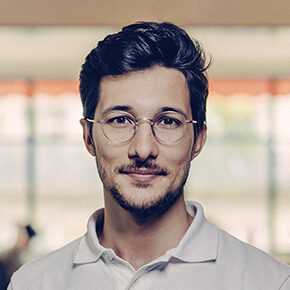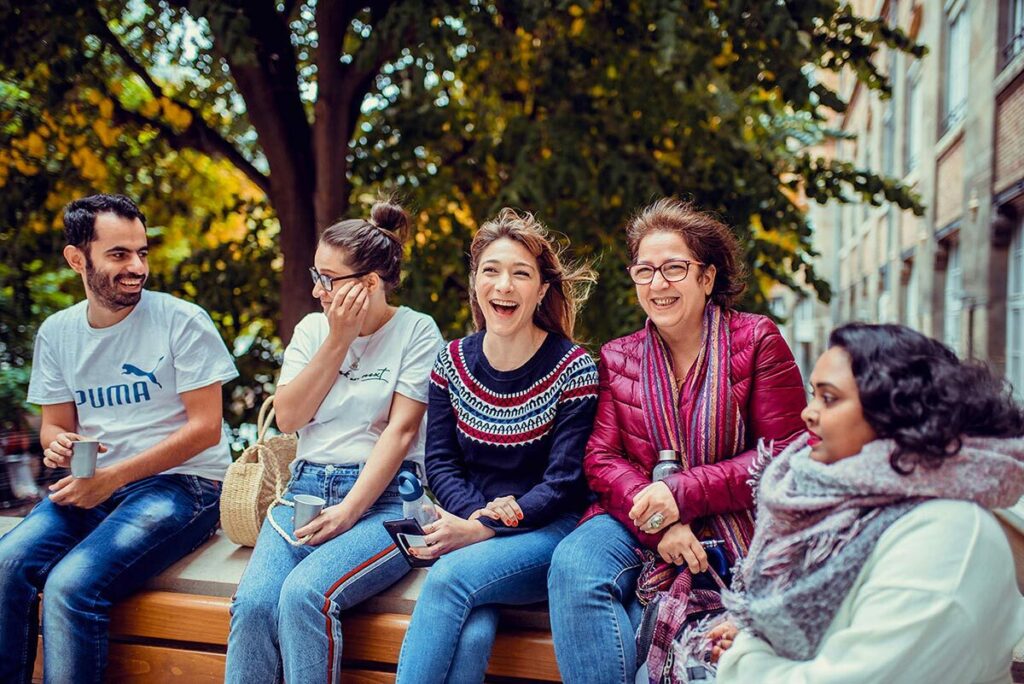Théo Scubla founded each One at the beginning of his Masters in Management at ESCP Business School with the willingness to provide a pragmatic and inclusive solution in order to enable refugees to fulfil their potential in host countries while making, the integration of the people on the move an opportunity of value creation for each and every one.

Hi Théo, first of all, can you tell us a bit more about your journey as an entrepreneur, what inspired you to create each One?
From early on, I was very much influenced by my grandmother’s history. She was Italian and moved to France when she was young, and she always told me about her frustration with not having been allowed to develop her full potential nor considered for her true worth. Just because she was an immigrant. Hearing this as a child truly shaped my vision of the world. So when I grew up, I asked myself: why not me? Why couldn’t I do something great too? From this day, this simple thought opened up a whole realm of possibilities.
From this day, I had a vision that helping refugees become fully integrated went beyond mere economic strategies.
Then a few encounters shaped my entrepreneurial journey. I had been at ESCP for about 10 days when I met two Syrian men: Omran, a professor, and Rateb, an engineer, as well as Alexandre Lederman, an affiliate professor at ESCP and known for co-founding the French nonprofit Les Restos du Coeur with comedian Coluche. Talking with them, I came to realise that there is a gap that exists between the actual potential of people who have had to flee their country and what we offer them.
From this day, I had a vision that helping refugees become fully integrated went beyond mere economic strategies. That it held new opportunities for the people who would reveal their talents and true potential, and the companies that would benefit from hiring them.
Working on a better inclusion of refugees is not just about finding people for jobs and positions that are hard to fill. It is also finding people who, because of who they are, because they bring diversity, because they have different experiences, will make a contribution that is both refreshing and at the same time extremely valuable for the company. And it is in this context that we wanted to create each One.
Did you enter university knowing you wanted to be a social entrepreneur? Since when have you dreamt of giving life to a structure such as each One?
I knew I had to become an entrepreneur. I had a vital need to create and, on the other hand, I knew I wanted my work to respond to an important social issue. When we started back in 2015 as a small association, we did it without realizing it was already social entrepreneurship. The only difference is that, at that time, there was not as much talk about social entrepreneurship as today.
I like this definition of the startup given by PayPal co-founder Peter Thiel: “A startup is the largest group of people you can convince of a plan to build a different future.” And that’s really the definition of entrepreneurship for me. What I’m interested in is the finality of our mission. And our mission is to make inclusion a high value-added asset, and to accompany as many people as possible so that they express their true potential in France or elsewhere.
What kind of challenges did you face while creating each One?
The biggest challenges rose when we decided to change the nature of our business structure. We started as a small association, but at the end of 2020, we found ourselves in a complicated situation in which we had to manage two companies plus the association, and it was a handful. We decided we needed to give each One the means it deserved to become successful and take off. To do that, we had to create a persistent business model.
I believe we must be able to rely on a sustainable model in order to remain independent and keep control over our strategy to reach our ambitions. All the while, this does not prevent us from remaining an organisation that is committed, accountable and ethical. Deciding to fully transition into a company was very difficult because it raised cultural questions within the company.
What for us was a logical reality — that a company could be an extremely powerful lever to create change and impact — was suspicious for others.
Not everyone agreed with us. We had to deal with executives and employees leaving. What for us was a logical reality — that a company could be an extremely powerful lever to create change and impact — was suspicious for others.
That was a very difficult period, but it was also an extremely rewarding one. Thanks to the decision we took, we have been able to develop and increase our impact enormously this year. Just because we have accepted and put into practice the idea that, yes, a company can have a positive impact.
What is your view on the current state of inclusion and diversity in the professional world today?
I recently went to the first Sommet de l’inclusion économique (Economic inclusion summit) organised by the Mozaïk Foundation in Paris, which was a real success. And what comes out of such an event is that everyone is aligned today in saying that inclusion is a high-stakes subject matter. We are more and more aware of the fact that inclusion is not only required for companies to keep being successful, have a good reputation and do good on the stock market, nor for companies to appeal to customers. But that, beyond this, inclusion is a real, smart investment.
You have already trained and put more than 2,000 refugees back to work thanks to each One’s programme. What are your hopes and dreams for the future?
From the beginning, we’ve had this vision of helping hundreds of thousands or even millions of people. When we look at the 2,000 people accompanied today, we feel a great pride because it is the mark of the success of the project in its first years, and at the same time we can’t help but see that the finish line for us is still very, very far.
We hope to find the tipping point that will truly signify a systemic change regarding the inclusion of refugees.
Now, everything is being done to ensure that soon 10,000 people per year will be accompanied. But we’re also aiming at helping 100,000 people per year by 2030. Beyond that, we hope to find the tipping point that will truly signify a systemic change regarding the inclusion of refugees.
Do you have an example or case that has particularly helped you to feel and see the impact you are able to have?
Of course, I met many, many beneficiaries. I will give you two very different examples. The first one is the one of Akmal, a 26-year-old Afghan we accompanied. He has just been hired as an employee at supermarket Monoprix, a job that he likes but also opens a gateway towards other opportunities. Aside from his job, Akmal has a passion for graphic design. His dream is to become a graphic designer. This job also gives him direct access to contacts at Monoprix so that he can, in the next few years, as we hope, evolve as a graphic designer.
We want to make sure that work brings them stability, satisfaction, pride and perspective.
We know that the first job the person finds in France is not necessarily their dream job, but, on the other hand, we want to make sure that work brings them stability, satisfaction, pride and perspective.
The other example I have is the one of Younès. Younès was an artist in his home country. When he came to France, he did not speak the language. We helped him learn French via the philanthropic programme. After that, he was able to evolve first at L’Oréal. Then he took a training course to take a new step in his professional life in the banking field, and was hired by BNP. It allowed him to go beyond his initial qualifications. He worked for various French companies for six years.
That time allowed him to build his network in France which, in the end, allowed him to return to his original profession. He is now quite a referenced artist and an art teacher.
What advice would you give to others looking to follow in your footsteps?
Don’t wait for external validation to feel credible or legitimate. If, as an entrepreneur, you feel that you want to bring something valuable to the table, and are sure of what you want to accomplish, then you are already legitimate. Define your vision and stick to it. Use your conviction to convince others. Have a very clear vision of the reality you want to create and, most importantly, surround yourself with people who are willing to follow you in the realisation of that vision.
